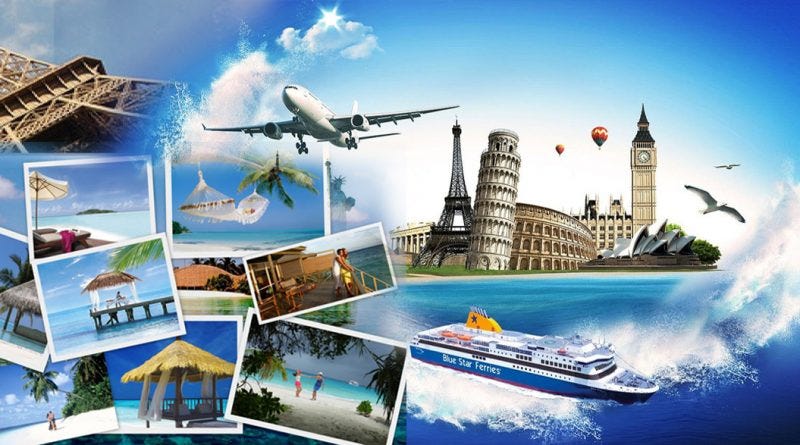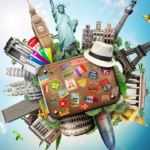Traveling smart means being organized, prepared, and thoughtful about how you plan and experience your trip. It can help you save money, avoid stress, and make the most of your time. Here are some key tips for traveling smart:
1. Plan Ahead, but Stay Flexible
- Do Your Research: Before you go, spend some time learning about your destination. Look up things like local culture, popular sights, safety tips, transportation, and the best time to visit. This helps you make the most of your time.
- Create an Itinerary: Plan out your activities, but leave some room for spontaneity. Some of the best travel experiences come from unplanned moments.
- Have a Backup Plan: Things don’t always go as expected (flights get delayed, attractions close unexpectedly), so have a few alternatives ready, like backup activities or restaurants to visit.
2. Pack Light and Smart
- Pack Only What You Need: The less you pack, the more freedom you’ll have. Aim to pack versatile clothing that can be mixed and matched. Use packing cubes or compression bags to save space.
- Essentials First: Bring travel essentials like your passport, credit cards, medications, chargers, and any necessary documents in your carry-on in case your checked luggage gets lost.
- Avoid Overpacking: Stick to a carry-on if possible to save time at the airport and avoid baggage fees. If you’re going to multiple destinations, pack items that can be easily layered and re-worn.
3. Use Technology to Your Advantage
- Travel Apps: Download apps that can make your trip easier, such as Google Maps for navigation, currency converters, flight tracking apps, or language translation tools. Many airlines and hotels have their own apps for smooth check-ins and updates.
- Offline Maps: Download offline maps (such as Google Maps or Maps.me) so you can navigate even without an internet connection.
- Digital Boarding Passes and Tickets: Save your boarding passes, tickets, and reservations digitally on your phone to reduce paper waste and avoid losing important documents.
4. Stay Safe
- Keep Copies of Important Documents: Make digital and physical copies of important documents like your passport, ID, travel insurance, and credit cards. Keep one set with you and store another set in a secure location, such as a hotel safe.
- Know Emergency Numbers: Familiarize yourself with the local emergency numbers for police, medical services, and fire. It’s also good to know the location of the nearest embassy or consulate in case of an emergency.
- Use Travel Insurance: Investing in travel insurance can be a lifesaver in case of unexpected cancellations, lost luggage, or medical emergencies.
5. Manage Your Money Smartly
- Use Credit Cards with No Foreign Transaction Fees: Many credit cards offer travel rewards and have no foreign transaction fees, which can save you money. Always inform your bank about your travel plans to avoid having your card frozen.
- Avoid Airport Currency Exchange: Currency exchange at airports often comes with poor rates and high fees. Instead, use ATMs in the city or exchange at local banks or currency exchange offices.
- Have Local Currency: While cards are widely accepted, it’s still useful to have some local cash on hand for smaller transactions, tips, or places that don’t accept cards.
6. Maximize Your Time
- Avoid Peak Travel Times: If possible, travel during off-peak seasons to avoid large crowds, higher prices, and long wait times at tourist attractions. Also, try to fly during less busy times (mid-week or early/late flights) to get better prices and less crowded airports.
- Use Skip-the-Line Tickets: For major tourist attractions, consider purchasing tickets in advance or using “skip-the-line” options to save time. This is especially helpful for popular museums, landmarks, and monuments.
- Rest and Stay Energized: Traveling can be physically draining, especially if you’re sightseeing non-stop. Don’t over-schedule your days—give yourself time to rest and recharge.
7. Travel Responsibly
- Be Culturally Aware: Research the local customs, traditions, and etiquette of the destination you’re visiting to avoid unintentionally offending anyone. A little respect for local culture goes a long way.
- Be Eco-conscious: Limit single-use plastics, reduce waste, and respect the environment. Consider staying in eco-friendly accommodations, using reusable water bottles, and supporting sustainable tourism initiatives.
- Support Local Businesses: Eat at locally-owned restaurants, shop at local markets, and choose activities that support the local community rather than large chains. This helps boost the local economy.
8. Health and Comfort
- Stay Hydrated and Eat Well: Travel can be exhausting, and long flights or road trips can dehydrate you. Drink plenty of water, eat balanced meals, and get enough sleep to keep your energy levels high.
- Bring Basic Health Supplies: Pack a small first-aid kit with medications, pain relievers, hand sanitizer, and other personal items. It’s easier to prevent sickness than deal with it while you’re away.
- Comfortable Travel Gear: Invest in comfortable footwear for walking and explore options like neck pillows, earplugs, or noise-canceling headphones for long flights or bus rides. A travel pillow can make a huge difference in your comfort during transit.
9. Be Open to New Experiences
- Step Outside Your Comfort Zone: Don’t be afraid to try new foods, take part in local activities, or meet new people. The best travel memories often come from embracing the unknown.
- Interact with Locals: Speak with locals to learn about their culture, ask for recommendations on hidden gems, and get insights into the destination that tourists often miss.
10. Stay Organized During Your Trip
- Keep Your Documents and Items Organized: Use a travel wallet or organizer to keep your passport, tickets, credit cards, and cash in one place. This will save you time and stress when you need something quickly.
- Track Your Expenses: Use budgeting apps or write down your expenses to stay within your budget. Keeping an eye on how much you’ve spent can help you adjust your plans if necessary.
Traveling smart is about making the most of your time, money, and energy while ensuring that you have a safe, comfortable, and enriching experience. Whether you’re a seasoned traveler or it’s your first trip, these strategies can help make your journey more enjoyable and stress-free. Always be adaptable, stay aware of your surroundings, and enjoy the journey!




